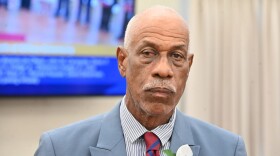ST. CROIX — In a letter to the governor obtained by WTJX, Delegate to Congress Stacey Plaskett raised concerns about a fast-approaching deadline of September 30 for federal funding in connection to disaster recovery projects, but the Office of Disaster Recovery clarified the territory is on track to meet the deadline.
Plaskett’s letter dated September 20 to Governor Albert Bryan Jr. was an apparent response to a letter asking her for a meeting concerning rum cover-over, Medicaid, and Treasury bond issues.
Plaskett, in her letter, highlighted a September 30 project obligation deadline to achieve a reduced local cost share, with billions in federal funding rather than territorial funding.
The delegate noted that she became aware of unresolved issues with critical infrastructure projects stemming from damages sustained in September 2017 during Hurricanes Irma and Maria through conversations with the Federal Emergency Management Agency and public reporting. She informed the governor in her letter that the central government should have directly shared the information.
“I understand that nine critical infrastructure projects and eight non-critical infrastructure projects do not have agreements yet, and it is possible that not all projects will be obligated before September 30, 2024,” Plaskett wrote, noting she was particularly concerned with projects at the territory’s two power plants.
Plaskett wrote that it would have been appropriate for her office to receive the information from the governor’s administration to support any conversations she might be able to have with the territory’s federal partners and to achieve the support needed to maximize benefits of the improved cost share. She noted President Joe Biden’s partial match waiver provided an improved cost-share requirement to 2% from 10% for critical infrastructure projects approved before September 30 and completed over the next 10 years, and 5% for other projects.
“I trust that the government of the Virgin Islands will move expeditiously to ensure the Virgin Islands receives the maximum federal funding,” Plaskett wrote.
Adrienne Williams-Octalien, Office of Disaster Recovery director, said the territory is on track to meet the federal deadline. She clarified that the projects do not need to be obligated by the deadline. She said the deadline is for the territory to accept FEMA’s fixed-cost offers. She further clarified there are only six projects left that would be affected by the deadline. She said the fixed-cost offers for projects at the territory’s power plants have already been accepted. She said it is expected that the fixed-cost offers for the remaining projects will be made and accepted on or before the deadline.
“We’re working very closely with FEMA to be able to accept those offers on or before September 30,” she said, adding that the projects must be completed by 2035. “That is a timeline FEMA has given to us, so we are working to ensure that we meet the timeline that has been stipulated.”

As ODR continues working to accept the fixed-cost offers, FEMA issued a statement Thursday announcing that the federal agency continues collaborating with territorial and federal partners to strengthen recovery from the 2017 hurricanes. As of September 1, $11.9 billion has been obligated for 1,539 projects through FEMA’s Public Assistance Program, including funding for emergency protective measures, permanent work, and management costs, according to FEMA. Public Assistance funding has been obligated toward key areas, including $1.68 billion for energy, $988 million for housing, $3.94 billion for education, and $2.84 billion for health and medical facilities.
Plaskett also raised concern in her letter regarding recent news reports about ODR’s decision to select a single firm for the Super Project Management Office contract award in what she noted appears to be “contravention of the published project management and construction management services request for proposals” that closed on May 23.
Hill International Inc., a global project and construction management firm, has filed a lawsuit to block the Virgin Islands Public Finance Authority/Office of Disaster Recovery from executing a contract it claims was “improperly awarded” to another company, CH2M Hill Inc., following a request for proposals.
Although Hill International filed the civil complaint September 10 in Superior Court, the PFA (ODR’s parent corporation) removed the case to District Court by filing a notice of removal in the federal court on September 12. Hill subsequently filed a motion in District Court to remand the case to Superior Court, arguing the PFA’s notice of removal is “facially defective.”
Plaskett noted in her letter that her staff contacted ODR requesting an understanding of the decision rationale prior to the publication of the lawsuit but that her inquiry did not receive a response. She wrote that contractors, developers, and others regularly contact her office to understand the territory’s rebuilding project process and capacity, noting the lack of information sharing hinders her ability to support the shared objectives of rebuilding “our home while growing the economy and opportunities.”
Williams-Octalien said Plaskett’s inquiry never reached her desk.
“I’m not sure who the inquiry went to, but I personally did not receive an inquiry,” she said.
The ODR director referred to the response filed in court as her office’s official position on the matter.
The PFA, in its opposition to Hill’s motion for a temporary restraining order, preliminary/permanent injunction, and declaratory relief, noted multiple provisions in the request for proposals that address the selection of a singular respondent, not multiple respondents. The PFA argued that it clearly reserved the right to determine the number of contractor awards.
Plaskett further indicated in her letter the looming expiration of federal funds meant to aid the territory’s recovery from the 2017 hurricanes originating from the Emergency Supplemental Historic Preservation Fund that the VI Department of Planning and Natural Resources’ State Historic Preservation Office received. Plaskett stressed that the funds must be expended by September 30. She noted that while others might have expressed to SHPO the possibility of an extension, her office’s read of Congress and the Biden administration was that it would be “highly unlikely.”
“It is deeply troubling that VISHPO has not taken heed of my office’s warnings, and that millions of dollars of federal funding are in peril for some of our most precious sites,” Plaskett wrote.
Sean Krigger, SHPO director, said the funding was distributed to areas impacted by Hurricanes Irma and Maria, as well as Hurricane Harvey, which made landfall on Texas and Louisiana in August 2017. He noted the Virgin Islands, Puerto Rico, and multiple states sought an extension. He said the U.S. House of Representatives approved a resolution to grant the extension that has not yet been approved by the U.S. Senate. He clarified SHPO is not in danger of losing “millions of dollars.”
“It is true as a collective whole when you include all the affected states, it is millions of dollars,” he said. “But in the case of the Virgin Islands, we’re down to several hundred thousand, and if we could at least get an extension, just for a couple months at least to the end of the year, that would have a tremendous effect on the projects in the Virgin Islands.”

Jamal Nielsen, DPNR spokesperson, confirmed SHPO has expended $9.4 million of $10 million received. He indicated via text message that invoices are in place to draw down the remaining $600,000 next week, noting that all funding will be exhausted by September 30. He clarified the extension is necessary for the program’s applicants to complete the work. If the work is not completed by the deadline, he noted the applicants must return the balance of the funds.
Krigger said work would have to stop September 30 on about 12 projects that recently received funding if Congress does not grant the extension.
“In some cases work is in progress, so we’re scrambling, trying to get the funding out to those projects so that those contractors could conclude,” he said. “We have a couple reimbursement projects, which work has already been done by the property owner and they’re just getting reimbursed for their efforts to secure and repair their historic properties.”
The projects span from historic homes damaged during the hurricanes to multiple churches, including St. John’s Episcopal (Anglican) and Lord God of Sabaoth Lutheran churches in Christiansted, Apothecary Hall in Frederiksted, and the Emmaus Moravian Church in Coral Bay on St. John, Krigger said.
“These are all projects that would greatly benefit from getting the extension,” he said.
SHPO does, however, have another option if Congress does not approve an extension by the deadline.
There is another effort to try to get an extension of the program as part of the U.S. Department of the Interior’s fiscal year 2025 budget, Krigger said.
“If the straightforward extension request is not done through the House and the Senate, it’s a possibility that it could also be done through the Department of Interior’s fiscal year 2025 budget,” he said.
Messages left with Plaskett’s office seeking comment were not returned as of the time of publication of this article.















